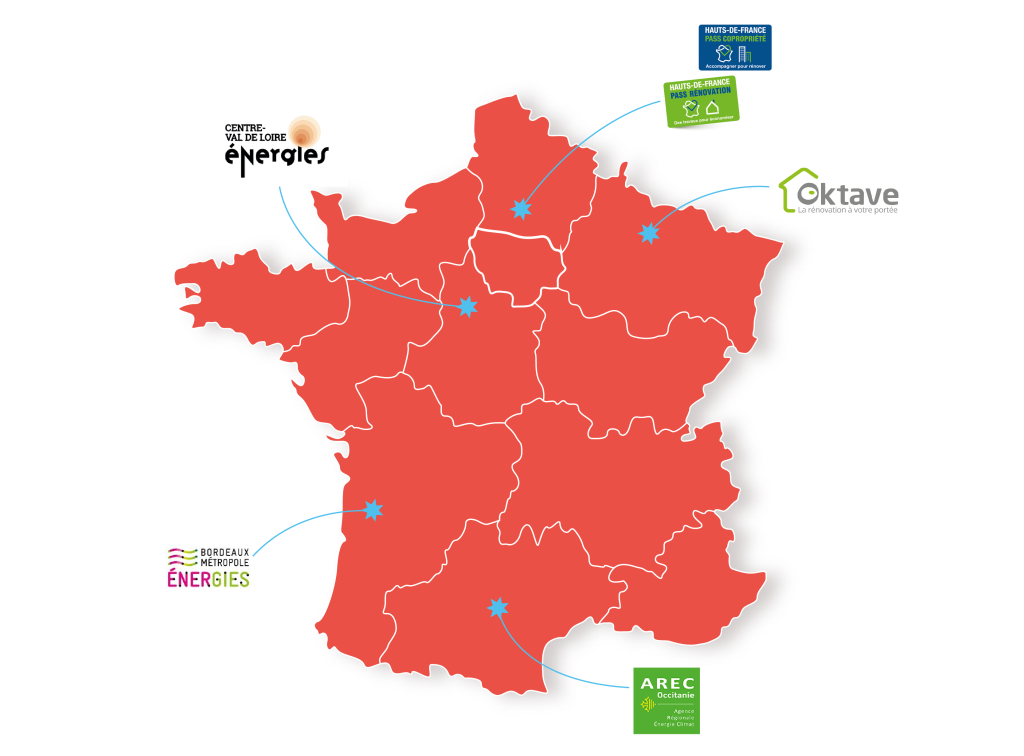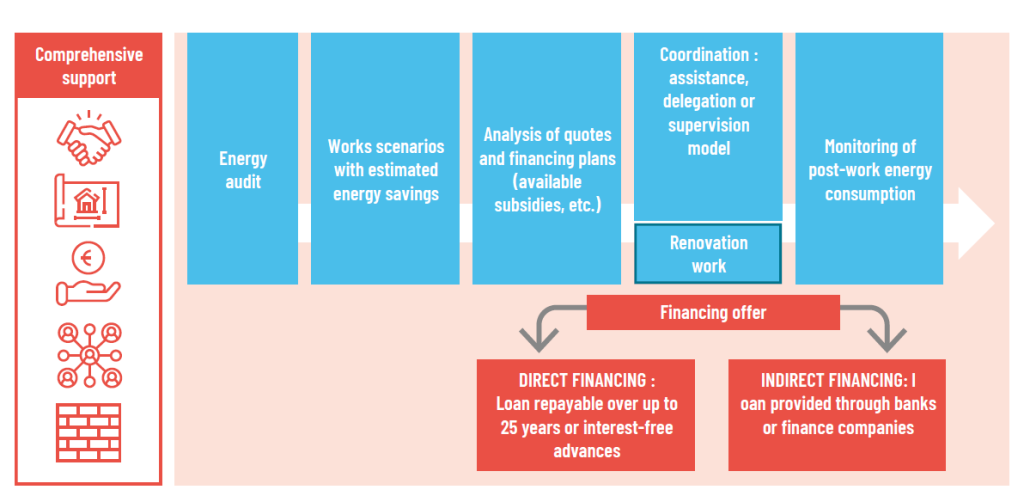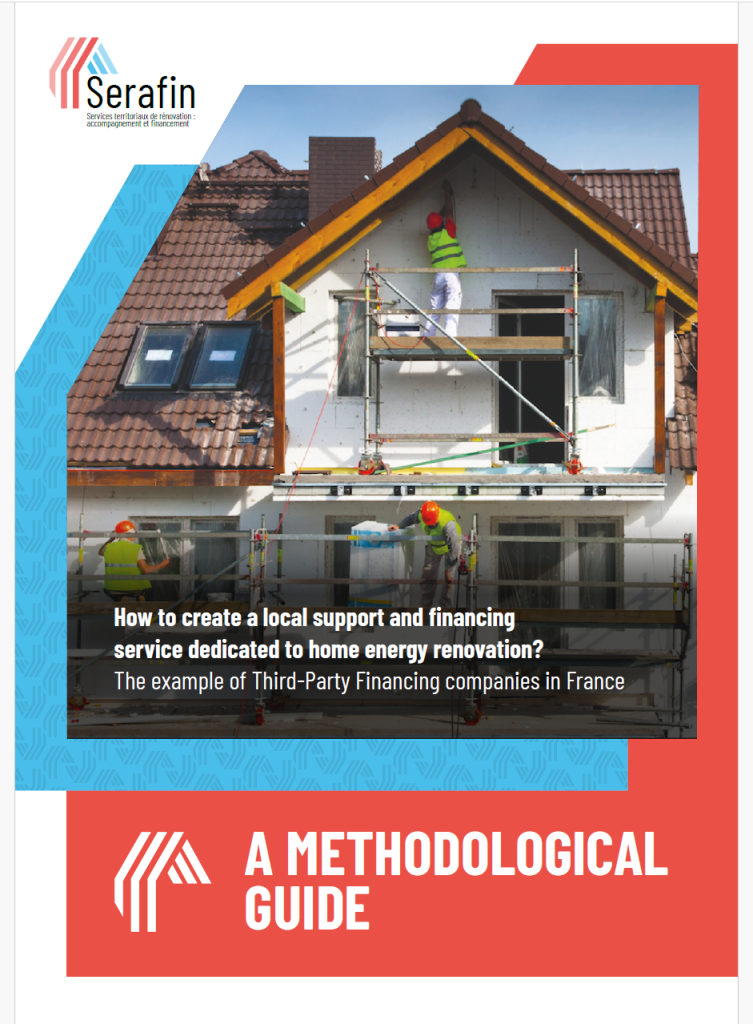In France, a specific one-stop shop model shakes up the deep energy renovation market
In France, Third-Party Financing companies set up by five regions and metropolis are a real game-changer for homeowners aspiring to deep energy renovation.
The five French Third-Party Financing companies, a specific one-stop shop model for home energy renovation, provide technical and financial solutions to homeowners aspiring to deep energy renovation, regardless of their income. Four factors make their offer a real standout on the market: it is local, simple, accessible and secure (guaranteed quality of works and energy savings).

Third-Party Financing (TPF) companies are operators established by local governments – metropolitan and regional councils. The fact that they are local (semi-) public bodies increases their credibility in the eyes of homeowners. The fact that their comprehensive support package includes accessible financing offer (low or zero-interest loans, pre-financing, integration of financial savings in the financing plan) makes deep energy renovation possible for every household. The fact that the quality of works and energy savings are guaranteed mitigates homeowners’ fears of investing important sums (in average €50-55 000 for a single-family home and €20 000 for a flat in a condominium) in deep renovation. All these elements make TPF companies a gamechanger on the renovation market and a key to achieving a zero-emission building stock by 2050.
In the regions where TPF companies operate, their volume of renovation works represents 30% of the deep energy renovation market. It is a model whose value no longer needs to be demonstrated, but which still needs to be supported and encouraged.
Alice Morcrette, Director of Haut-de-France Pass Rénovation (TPF company) and president of the SERAFIN Association
Third-Party Financing companies’ unique offer: direct or indirect financing
One of the TPF companies’ unique features is that they provide direct or indirect financing with multiple benefits:
- no upfront investment (TPF company pays upfront for renovation works),
- pre-financing of public subsidies,
- direct low-interest loans repayable after work completion over a period of up to 25 years (versus 10 years for consumer loans offered by banks) and integrating expected energy savings,
- indirect interest-free loan (Eco-prêt à taux zéro) of up to €50,000 (only available for global and ambitious renovation works) repayable over a period of up to 20 years and integrating expected energy savings,
- financing solution is customised and available to all homeowners, regardless of their income.
Upfront financing, insecurity of achieving calculated energy savings and their non-consideration by commercial banks offering loans, are the main obstacles to ambitious energy renovation which requires considerable investments by homeowners.
The success of TPF companies lies in the fact that they provide all services that are simple, accessible and secure in one single place, physically close to homeowners.

The contract with homeowners guarantees the quality of renovation works
All TPF companies are committed to high quality, global and ambitious renovation works achieving high energy savings. Together with their main partners they created a standard reference framework for the quality of renovation works which allows them to gather the same data, compare their practices and comply with the commonly agreed high quality standards. More importantly, homeowners are sure to achieve estimated energy and financial savings and to invest without any bad surprise at the end. For financiers and banks, the guarantee of quality is a basis for securing the repayment of loans.
The standard reference framework is built on three principles:
- The contract with homeowners guarantees the quality of renovation works via the qualification of renovation experts, respect of the performance target (BBC Renovation 2024 standard – Low Energy Renovation 2024 standard, a label defined by the French government) and technical & financial specifications.
- Standard processes are developedfor the renovation of single-family homes and collective housing, for the development of a financing plan and for the estimation of costs of works and energy savings.
- A quality and compliance approach is implemented via application protocols, accreditation process and continuous improvement of the standard reference framework.
This framework is also recognised by insurers as an effective approach to risk management. The risk of non-quality renovation is lower and thus more easily transferrable to insurance companies.
Year 2023 in figures: 6,160 renovation projects for €173.2 million
The famous proverb says: “If you want to go fast, go alone, if you want to go far, go together.” In the beginning of 2022, TPF companies joined forces with their main partners to create a nation-wide SERAFIN association with the objective to share and pool their resources, (expertise, studies, procedures, development of IT tools, etc.), to define a common reference framework for the quality of renovation works, to optimise the financing offer for their clients and to amplify their advocacy action at national level.
The results of this collaboration? SERAFIN members can boast impressive collective achievements for the year 2023: 18,000 energy audits, 6,160 home renovation projects representing an investment of €173.2 million, 1,300 loans disbursed for a total amount of €40 million.
How to replicate this model in other cities and regions?
The experience of TPF companies in France, which is unique in Europe and has demonstrated its effectiveness is now available to all cities and regions wishing to set up a Third-Party Financing company or a one-stop shop for home energy renovation.
The new methodological guide describes the pathways and factors for success, as well as the limits and drawbacks of setting up an integrated home renovation service. The aim of this guide is to present the existing TPF companies and their role (part 1), explain how they operate (part 2), and help public players, particularly local authorities, set up a TPF company in their area if the conditions are right (parts 3 and 4).
Complementary to the guidebook are the interviews – “Portraits of players” – with the directors or technicians of the TPF companies.
SERAFIN association wants to make these elements available to as many people as possible, so that, in a near future, they become the norm in the renovation market.
The European Union wants to achieve a zero-emission building stock by 2050 and local one-stop shops for home energy renovation are key to achieving this target. According to the recently adopted Energy Efficiency Directive and the Energy Performance of Buildings Directive, Member States will need to roll out one one-stop shop for every 80,000 inhabitants or at least one per region to accompany homeowners, including those living in energy poverty and vulnerable households, on their renovation journey. Cities and regions will play a crucial role here – identifying vulnerable households, establishing local partnerships with the building sector, setting up one-stop shops… The reward they can expect for their effort? Flourishing local renovation markets, people living in comfortable homes resistant to fluctating energy prices and, hopefully, the achievement of their local energy and climate targets.
Is your city or region planning to set up a one-stop shop for home energy renovation? Do not start from scratch! Join the European initiative EU Peers – the European Community for Integrated Home Renovation Services – and get in touch with the EU-wide network of existing one-stop shops and their supporters!
The SERAFIN association was created and its activities and tools developed and shared thanks to the ORFEE project, funded by the EU’s Horizon 2020 programme. Four years of hard work did not stop at the end of the project (May 2024). The SERAFIN association continues its activities. You can follow them on the SERAFIN website and Linkedin.


